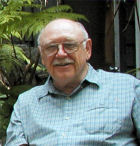John Ryan
BA, University of Chicago
MBA, University of Chicago
 John Ryan formed his consulting company in 1971. Previously, he had worked
as an economist for the Denver Research Institute (DRI) of the University
of Denver, specializing in regional economics—tourism and energy
impacts.
John Ryan formed his consulting company in 1971. Previously, he had worked
as an economist for the Denver Research Institute (DRI) of the University
of Denver, specializing in regional economics—tourism and energy
impacts.
His consulting experience has related to the opportunities and problems associated with economic growth. He has conducted scores of market feasibility studies and economic impact reports. The subjects have included housing projects, commercial and industrial parks, performing arts centers, hospitals, golf courses, airports, new towns and other commercial developments.
Ryan wrote the first environmental impact statement (for Benchmark at Beaver Creek) that was required after Eagle County adopted subdivision requirements. Thereafter, Vail Associates hired him to assist the US Forest Service to write the Social-Economic Impacts section of its EIS for Beaver Creek. Eagle County then hired Ryan to conduct its first employee housing study in 1977.
After ten years of various consulting roles with the Town of Vail, Vail Associates, and Eagle County, he was consultant to the Town of Vail’s Economic Development commission as it reevaluated its policies when shifting from a growth-oriented ski area to a mature, operating resort. Ryan also was a member of the team several years ago when JKA conducted its first Cultural Attachment project in West Virginia and Virginia.
These projects have provided Ryan with a vast array of experience in rural communities. Having worked for both private sector developers performing market studies and the local governments conducting economic and fiscal impacts, Ryan will play a key role in the James Kent Associates Team.
Additionally, John Ryan and James Kent have experience in working together; we have teamed together on dozens of projects over the years. Ryan has worked extensively on issue-oriented projects at the neighborhood level. With FUND Pacific (now, James Kent Associates), for example, he was project manager for a near two-year consulting assignment with the City and County of Honolulu to design a Social Impact Management System (SIMS)--developing procedures to mitigate some of the negative social and economic impacts resulting from major developments. This approach requires extensive fieldwork - describing issues at the neighborhood level and tying them to the informal networks of people who carry the issues.
Cobalt Web Designs